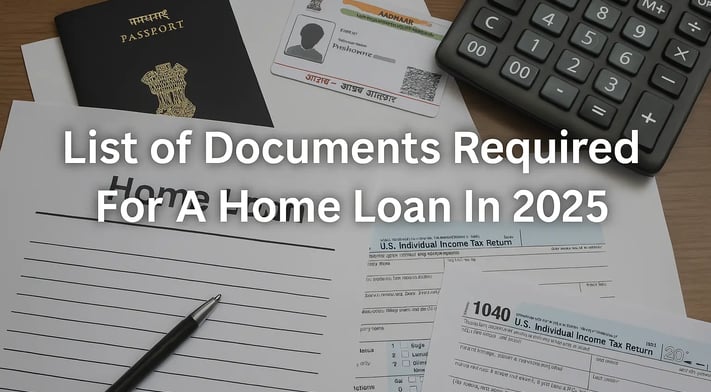List Of Documents Required For A Home Loan In 2025
Discover the complete list of documents required for a home loan in 2025. Learn essential tips and steps to organize your paperwork for a hassle-free loan approval.
Archita
4/5/20255 min read


Have you ever wondered exactly what documents you need to secure a home loan in 2025?
Securing a home loan is a significant milestone in your journey toward homeownership. With evolving digital processes and streamlined procedures, the document checklist for a home loan has become more comprehensive yet straightforward in 2025. In this guide, we’ll walk you through the list of documents required for a home loan in 2025, explain why each is essential, and provide tips to ensure a smooth application process.
Whether you’re a salaried professional or a self-employed entrepreneur, understanding these requirements will empower you to secure the best financing for your dream home.
Introduction
Buying a home is one of the most significant financial commitments you’ll make. The home loan application process can seem daunting, but having all your documents organized and ready is half the battle won. In 2025, lenders have embraced digital transformation, making the submission and verification process faster and more transparent. However, the basic documents required remain similar. This guide covers everything from proof of identity to income verification and property-related documents, ensuring you’re fully prepared when applying for your home loan.
Essential Documents Required for a Home Loan
1. Proof of Identity
One of the first things a lender will require is proof of your identity. This is crucial for verifying who you are and preventing fraudulent applications. Commonly accepted documents include:
Passport
Voter ID Card
Driving License
Aadhaar Card
Make sure the document you choose is valid and matches the details provided in your application.
2. Proof of Address
Lenders need to confirm your residential address to avoid discrepancies in their records. Accepted documents often include:
Utility Bills (electricity, water, or gas bill) not older than 3 months
Aadhaar Card (if the address is mentioned)
Passport (if it shows your address)
Rental Agreement or Property Tax Receipt
Ensure that the document clearly displays your name and current address.
3. Proof of Income
Income verification is one of the most critical aspects of a home loan application. Lenders assess your ability to repay the loan by verifying your income through:
Salary Slips for the last 3 to 6 months (for salaried individuals)
Form 16 and Income Tax Returns (ITR) for the past 2-3 years
Bank Statements for the last 6 months (to reflect salary credits)
Employment Certificate or Letter of Employment
For self-employed individuals:
Profit & Loss Account and Balance Sheet (audited for at least the last 2 years)
GST Returns (if applicable)
Business Bank Statements for the last 6 months
These documents help the lender determine your repayment capacity and overall creditworthiness.
4. Employment and Business Documents
Depending on whether you are salaried or self-employed, additional documents may be required to prove your professional stability:
Salaried Applicants:
Employment Letter confirming your designation, salary, and tenure
Service Certificate (if applicable)
Self-Employed Applicants:
Business Registration Certificate
Partnership Deed or Memorandum of Association (MOA) (for companies)
Audited Financial Statements
These documents provide further evidence of your financial stability and help lenders assess risk.
5. Property-Related Documents
When applying for a home loan, it’s not just about proving your income – the property itself needs verification too. Essential property documents include:
Sale Deed of the property
Title Deed and Encumbrance Certificate (to prove clear ownership)
Approved Building Plan (for constructed properties)
No Objection Certificates (NOCs) from relevant authorities
Property Tax Receipts and Utility Bills (to confirm no pending dues)
These documents ensure that the property is legally compliant and free of any disputes or liabilities.
6. Additional Documents
Some lenders might require additional documents based on their policies and your unique situation. These might include:
Photographs: Passport-size photographs of the applicant(s)
KYC Documents: Standard Know Your Customer (KYC) documentation as per RBI guidelines
Credit Report: Although not directly submitted, a good credit score (typically above 750) is essential and may be checked by the lender.
Embracing Digital Innovations in Home Loan Applications
In 2025, the process of applying for a home loan has been greatly enhanced by digital technologies. Many banks now offer online application portals, where you can upload scanned copies of all your documents. E-signatures and digital verification systems reduce paperwork and speed up the processing time. Some lenders are even exploring the use of blockchain technology for secure document storage and authentication, further increasing transparency and reducing fraud risks.
NCR Housing and Home Loan Documentation
The National Capital Region (NCR) remains one of India’s most dynamic real estate markets. When applying for a home loan in the NCR, additional considerations might come into play:
Higher Stamp Duties: Due to the premium nature of properties in the NCR, ensuring that all tax and duty receipts are up-to-date is crucial.
Increased Scrutiny: Given the high value of transactions, lenders in the NCR tend to verify documents more rigorously.
Digital Adoption: NCR regions are at the forefront of adopting digital tools for loan processing. Ensuring that all your documents are in a digital-friendly format can speed up your application process.
Special Schemes: Some banks offer special home loan schemes for properties in the NCR, often with better interest rates or faster processing times, so it’s worthwhile to check for any regional benefits.
Understanding the specific documentation nuances in the NCR can give you a competitive edge and help you navigate the home loan process more efficiently.
Tips for Organizing Your Documents
Having all your documents organized can save you a great deal of time and stress:
Create a Checklist: Maintain a comprehensive checklist of all required documents.
Digitize Your Files: Scan all documents and save them in a secure cloud storage service.
Update Regularly: Make sure all documents are up-to-date, especially income proofs and property-related documents.
Keep Originals Safe: While digital copies are useful, always keep the original documents safe, as you may need to present them for physical verification.
These simple organizational strategies can streamline your application process and help you avoid last-minute hassles.
Conclusion
Navigating the home loan document requirements in 2025 doesn’t have to be overwhelming. By understanding the essential documents – from proof of identity and income verification to property-related documents – and leveraging the digital tools available today, you can streamline the process significantly. Whether you’re looking to secure a loan for a property in a bustling metropolis or the ever-evolving NCR housing market, having your documents in order is the first step towards a smooth and successful application. Preparation, organization, and staying updated with the latest digital innovations are key to making your home loan journey as stress-free as possible.
Frequently Asked Questions (FAQs)
Q1. What are the primary documents required for a home loan application?
A1. The primary documents include proof of identity (Passport, Aadhaar, Voter ID), proof of address, proof of income (salary slips, ITRs, bank statements), and property-related documents (sale deed, title deed, approved building plan).
Q2. Are there any additional documents for self-employed applicants?
A2. Yes, self-employed individuals should provide audited financial statements, GST returns (if applicable), and business bank statements to verify their income and financial stability.
Q3. How does digitalization impact the home loan application process in 2025?
A3. Digitalization allows you to submit documents online via e-portals, use e-signatures, and benefit from faster document verification. Some banks are even using blockchain for secure record-keeping.
Q4. What specific documents should be prepared for properties in the NCR?
A4. In the NCR, in addition to the standard documents, ensure you have updated stamp duty receipts and be prepared for additional scrutiny. Digital copies in an easily accessible format can also help speed up the process.
Q5. How can I ensure my documents are organized for a smooth loan application?
A5. Create a checklist, digitize your documents, update them regularly, and keep the originals secure for physical verification if required.
NCR Housing
Your guide to NCR housing insights and tips.
Subscribe us
© 2025. All rights reserved.
